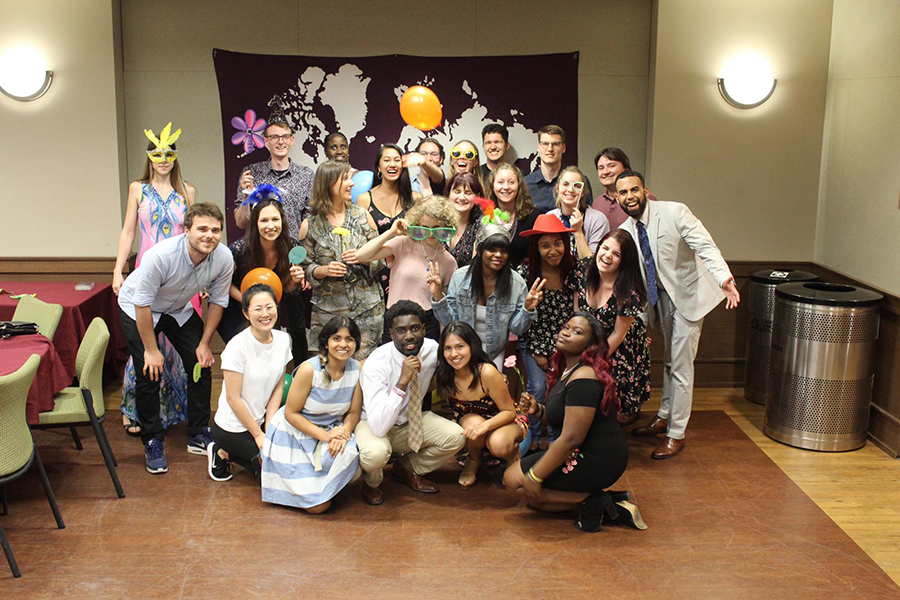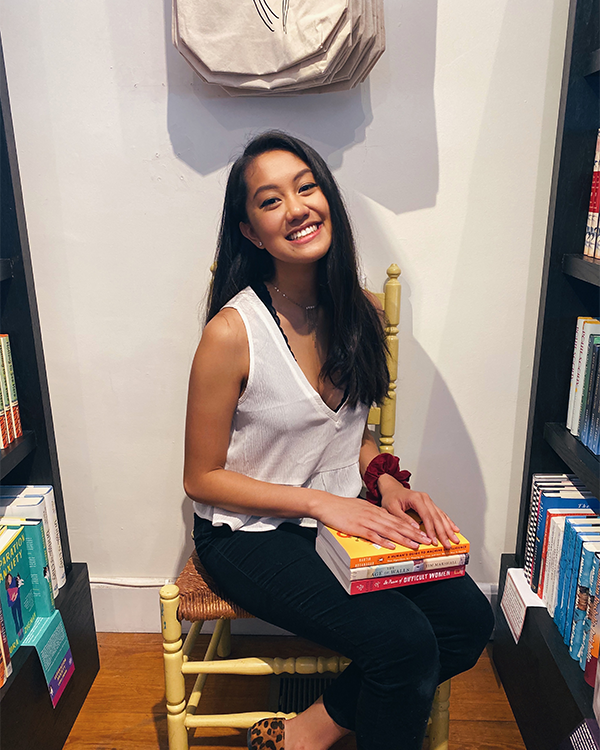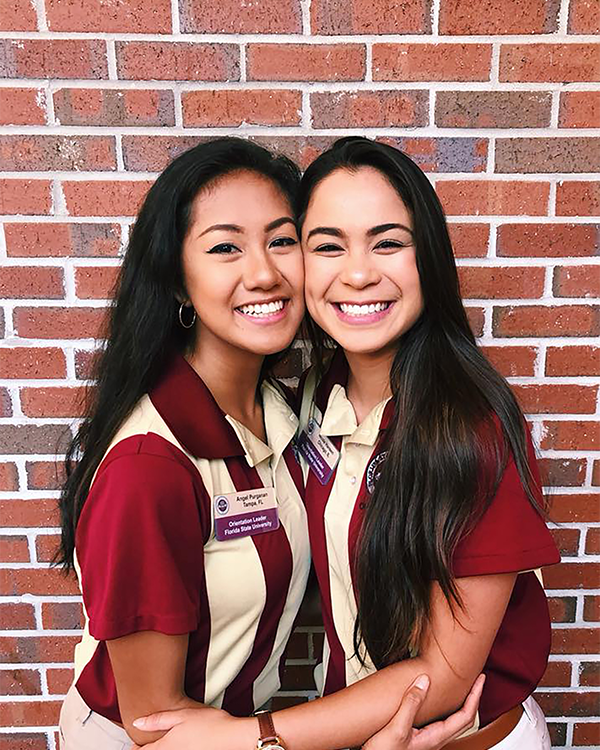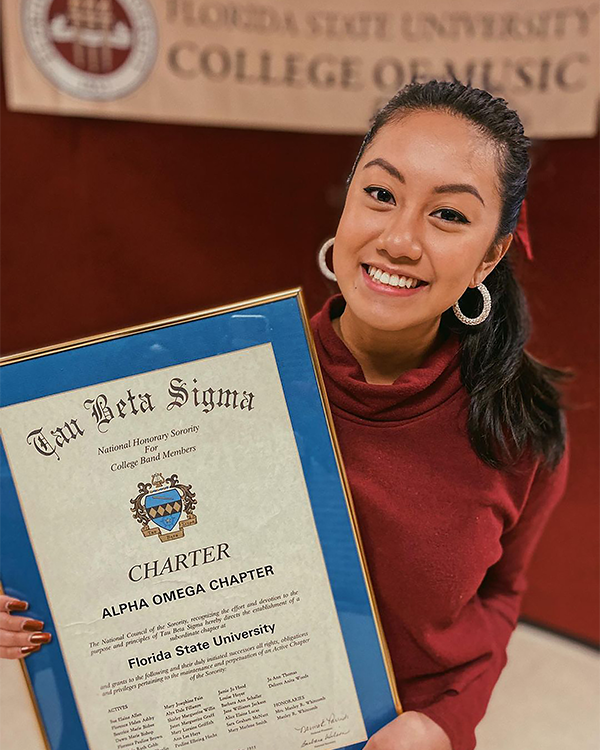Ethical Considerations
Alumna Angel Purganan highlights how humanistic skills support data analysis, tech success

Saying Angel Purganan has a broad range of interests is a bit of an understatement.
When the Tampa, Fla., native graduated from Florida State University this spring, it was with dual degrees in philosophy and political science and minors in Middle Eastern studies and history. The 2020 Social Science Scholar also spent four years as a member of the FSU Marching Chief’s clarinet section and later served as president of the Alpha Omega chapter of Tau Beta Sigma music sorority. And, she volunteered for four years with FSU’s New Student and Family Programs, helping the newest Noles find their place in the campus community.
Purganan has always been drawn to the intersections of culture, knowledge and the human experience. After earning an international baccalaureate degree in high school, she was ready for an immersive cultural and community experience during college. It was the dynamic range of academic options and the vibrant Marching Chiefs that drew her to FSU, although she chose not to major in music. She also tutored migrant and refugee students in English at Leon High School.
“Interacting with so many different people from so many different walks of life gave me a sense of diversity and community I never would have experienced otherwise,” she said.
In the classroom, Purganan chose her fields to build a strong social and humanitarian understanding of the world that would be applicable to a variety of careers. The skills she possessed as a humanities major aided her in developing the communication styles needed when interacting with a variety of students, parents, and organizations about their unique issues.




“Being able to communicate one’s ideas effectively is a necessity in any field,” Purganan said. “While concentrating my studies in these areas, I also developed other skills, like data analysis and language learning, through the extracurriculars.”
It is precisely Purganan’s ability to make connections across groups and disciplines — and her Olympic-level time-management skills — that make her a keen analyst.
Purganan interned as a research assistant with the DeVoe L. Moore Center, a public-policy think tank involved in examining market-oriented solutions to pressing social problems at both state and local levels in Florida, compiling data for the Florida Open Government website using Tableau, a data visualization software. The position was recommended to her specifically because of her background in the humanities: Beyond reviewing the pure data, Purganan was able to interpret and present it in ways that humans understand.
Samuel Staley, the current director at the DeVoe L. Moore Center, believes the value of any team member lies within their diversity of insight and the experience they can bring to projects. To him, leaders must have the ability to think across disciplines and use multiple lenses to solve problems.
“The key is to go from multi-disciplinary — where you develop separate skills from different traditions — to interdisciplinary, where these perspectives are integrated and work off of each other,” Staley said. “Angel is a great example of these skills, both in her major and the plethora of on-campus activities and organizations she has pursued.”
Purganan and Staley are united in the belief that there must be a necessary connection between the humanities and data science. Purganan authored an op-ed in the Tallahassee Democrat last March about the subject.
“Those with backgrounds in philosophy, ethics, anthropology, and humanities-related disciplines are contributing to innovation and product development for cutting-edge businesses such as robotics. They provide the frameworks and programming designs for how technology can and should be used.”
— Angel Purganan
At the time, a bill proposed cuts to lottery-funded scholarships for high-achieving Florida high school graduates, known as Bright Futures, for those pursuing humanities degrees in college. In the article, Purganan highlighted her experience as a dual major and her ability to easily acquire a job geared toward science, technology, engineering, and math majors because of the unique perspective and specialties she gained in the humanities.
“From sociologists working on today’s popular dating apps, to anthropologists working at Nissan, successful data analysis requires both humanistic and technical skills,” she wrote. “Those with backgrounds in philosophy, ethics, anthropology, and humanities-related disciplines are contributing to innovation and product development for cutting-edge businesses such as robotics. They provide the frameworks and programming designs for how technology can and should be used.”
As the emphasis on humanistic skills continues to rise in the labor market, educational institutions will need to shift their focus and prepare their students for these interdisciplinary environments. Collaborative environments where students are encouraged to integrate with one another lead to new perspectives and deeper understandings of those around them, she explained.
For the near future, Purganan is putting her published perspective into career action. She’s slated to travel to South Korea in early 2022 to teach English as a second language to local students. Following this opportunity, Purganan plans to pursue a master’s degree that will allow her to secure a position as an ethics researcher in the video game industry in the Asia Pacific region.
“I missed out on the chance to study abroad due to COVID-19, so this move will let me engage with an entirely new culture and be inspired by the diverse experiences I can’t wait to have,” she said.
Chase Clough graduated in December 2021 with a double major in advertising and English with a concentration in editing, writing and media.
